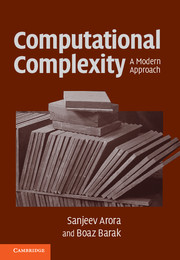Book contents
- Frontmatter
- Contents
- About this book
- Acknowledgments
- Introduction
- 0 Notational conventions
- PART ONE BASIC COMPLEXITY CLASSES
- PART TWO LOWER BOUNDS FOR CONCRETE COMPUTATIONAL MODELS
- 12 Decision trees
- 13 Communication complexity
- 14 Circuit lower bounds: Complexity theory's Waterloo
- 15 Proof complexity
- 16 Algebraic computation models
- PART THREE ADVANCED TOPICS
- Appendix: Mathematical background
- Hints and selected exercises
- Main theorems and definitions
- Bibliography
- Index
- Complexity class index
13 - Communication complexity
from PART TWO - LOWER BOUNDS FOR CONCRETE COMPUTATIONAL MODELS
Published online by Cambridge University Press: 05 June 2012
- Frontmatter
- Contents
- About this book
- Acknowledgments
- Introduction
- 0 Notational conventions
- PART ONE BASIC COMPLEXITY CLASSES
- PART TWO LOWER BOUNDS FOR CONCRETE COMPUTATIONAL MODELS
- 12 Decision trees
- 13 Communication complexity
- 14 Circuit lower bounds: Complexity theory's Waterloo
- 15 Proof complexity
- 16 Algebraic computation models
- PART THREE ADVANCED TOPICS
- Appendix: Mathematical background
- Hints and selected exercises
- Main theorems and definitions
- Bibliography
- Index
- Complexity class index
Summary
In this paper we have studied the information exchange needed, when two processors cooperate to compute Boolean-valued functions.
–Andrew Yao, 1979Communication complexity concerns the following scenario. There are two players with unlimited computational power, each of whom holds an n bit input, say x and y. Neither knows the other's input, and they wish to collaboratively compute f(x, y) where the function f:{0, 1}n × {0, 1}n → {0, 1} is known to both. Furthermore, they had foreseen this situation (e.g., one of the parties could be a spacecraft and the other could be the base station on earth), so they had already–before they knew their inputs x, y–agreed upon a protocol for communication. The cost of this protocol is the number of bits communicated by the players for the worst-case choice of inputs x, y.
Researchers have studied many modifications of this basic scenario, including randomized protocols, nondeterministic protocols, and average-case protocols. Furthermore, lower bounds on communication complexity have uses in a variety of areas, including lower bounds for parallel and VLSI computation, circuit lower bounds, polyhedral theory, data structure lower bounds, and more. Communication complexity has been one of the most successful models studied in complexity, as it strikes the elusive balance of being simple enough so that we can actually prove strong lower bounds, but general enough so we can obtain important applications of these lower bounds.
- Type
- Chapter
- Information
- Computational ComplexityA Modern Approach, pp. 270 - 285Publisher: Cambridge University PressPrint publication year: 2009



